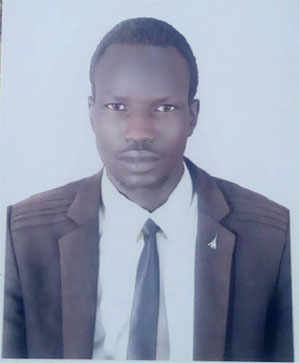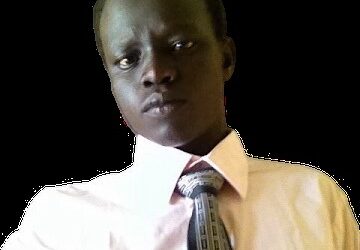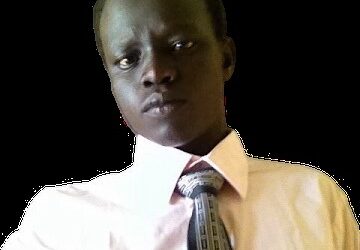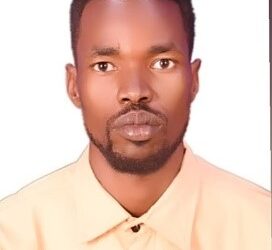By Ustaz Mark Bang
There are many problems with us, and those who never know what the future might bring to everyone must understand this.
Look back to the situation you have been ignoring others and the situation you have hoped that nothing would change. For we are panicking about all the aspects of things that are happening to you or me, many of our close friends, colleagues, and relatives. When trying to pick a phone to call their phones, we end up missing our calls answered simply because they may think one call is just to beg or look for a job.
No one knows exactly the reason one may call him or her. Sometimes the call from a poor person may have a positive impact yet go in vain. We don’t know for sure when these individuals were looking for help, whether their calls were turned down or picked, and I know very well their calls were answered, and that is the reason why they are now holding those positions they are now holding.
So, what is your problem, dear? Do this or that to any of the people you are now doing to, but remember that the time will come or one day when you may seek help from that same person you have been ignoring, and the same result will happen. We all have learned in the English language that “Everyone has his/her own clock; you wait for its click.” Waiting for our time is what all of us have longed for. Therefore, here is the message to anyone doing this thing there to carry on doing it and wait for the results to come as a U-turn where crying is going to be the focus of the day.
When they sit, converse, or do their own things, they do it joyously, not knowing when the time for downfall will come.
There is time for everything. Time to look down on others, to seek their support, and time to enjoy everything that seems good to yourself. We believe if all their making were not happening to them, they wouldn’t have had chances to own a good mansion, drive a car, and have a very nice office. Never make your own friends, colleagues, or relatives like the clothes we wear, yes! When clothes are dirty, we change them and wash clothes, but people are people, and they are the reason why one may get an opportunity in one way or another. Never forget the good things those people have done to you or the things they may do in the future, for the future is a vast and long journey to go, a journey that needs sacrifices, unity, and tolerance. Most elderly, women, and children have suffered more than any person else here in our country.
To emphasize this, this is a call to parents to allow children to live a childhood uninterrupted from child labor, marriage, and recruitment by armed groups. The pupils representing various schools in South Sudan asked the leaders and donors to prioritize issues that matter to their generation to create a better future for all children.
During the face-to-face discussion in front of fellow children and guests, the four girls and two boys demanded—on behalf of other children—their non-negotiable rights to education, health, water, shelter, food, and protection, among others. Children in South Sudan face many daily challenges, including poor levels of education, limited access to healthcare and vaccinations, high levels of malnutrition, frequent floods, conflict, and food shortages. When our country was at war with Sudan, we as children living bushes’ lives seemed better than the present generation. Most of us have suffered economic hardship. Children do not get the quality education that they deserve because teachers are not well paid. They do not have enough school materials. Girls are the most affected because the government does not protect them enough against early marriage.”
18-year-old May hardly rest from work, touched on the issue of child labour, noting that several children are allowed to work as bus conductors, cattle herders, firewood collectors, and construction workers because of poverty.
Parents send their children to work in the market because they cannot afford to take care of them. These children don’t go to school and are not protected in the places they work. This is child labor and is against the Constitution of the Republic. They lack medical facilities, especially in remote areas. In many areas of South Sudan, children have to walk for hours to the nearest health clinic, which is often no more than one room with few drugs and no trained staff. Forced marriage has been another reason barricading opportunities for girl-child learning. Most of our young girls find themselves as victims of this thing happening in the country, and failure to accept it means one may face hardship in life, sometimes harassed for no reason.
Our laws are not being implemented; perpetrators of violence against children are not arrested and tried in public. Cases of forced marriages in the villages are not detected, and no one is encouraging the girls to report these violations against their rights.
Many children in the rural areas have no access to scholastic materials; many children in town are hawking to make money to support their families; and many girls do not know where to report cases of rape and early marriage. What is the government doing to address these issues, which will affect the future of these children? In Northern Bahr El-Ghazal, Aweil, a 5-year-old child, was rapped to death, and nothing has been done. Where is the government? What is the government our call as ours doing? It’s heartening seeing all these things happening, and nothing is helping.
Many children remain vulnerable, just like recruiting them into armed groups, family separation and abduction, sexual and economic exploitation, physical violence, and psychological trauma, and in some cases, lack of necessary and adequate adult care or support. Education in South Sudan remains an urgent priority, with just 27 per cent of the population able to read or write and less than half of children enrolled in school.
Should we only consider the importance of children but also their rights and care for their needs in South Sudan? It has to be a priority we all need to take. To achieve some of the demands of the children, we have to work hard across the ten states in South Sudan, where we and our government offer services such as child protection, child rights governance, education, food security and livelihoods, health and nutrition, and humanitarian response programs.
Therefore, the Ministry for General Education and Instruction and other NGOs like UNICEF and Save the Children have to support curriculum development at the national level; co-chair the Education Cluster for Education in Emergencies; construct classrooms, temporary learning spaces, and WASH facilities, including latrines and boreholes in schools; support centres for early childhood development; and train teachers, Parents Teachers Associations, Social Advocacy Teams, and local education authorities, including headteachers. “Public Staunchest Ally.”
The writer of this article is a human right activist, writer and professional teacher.




